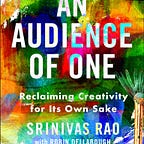7 Habits of Highly Prolific Writers
The other day a friend called me and asked how I’ve managed to be so prolific between writing a book, recording 2 podcasts every week, a weekly newsletter and articles here on medium. Like almost everybody, I have moments throughout the day when I’m procrastinating. But there a few habits that I’ve observed in prolific writers, and adopted myself.
1.They Block email and distracting Web Sites
Block all distracting web sites for the first several hours of the day. This one simple thing will do more for your ability to be prolific and productive than every other concept combined.
Rescuetime, Heyfocus and Stayfocused are all great tools for this.
This is really about designing an environment for optimal performance and creativity. It also eliminates the need for willpower.
2. They Read Good Books
Earlier this week I talked about why I always read before I write. Every morning before I put a single word down in my notebook I absorb myself in good writing. By reading good books you absorb the sound of good sentences, and you can’t help but write better than you would have otherwise.
3.They Don’t Wait to be Inspired
Steven Pressfield’s quote on this is one of my personal favorites.
“Someone once asked Somerset Maughham if he wrote on a schedule or only when struck by inspiration. “I write only when inspiration strikes,” he replied. “Fortunately it strikes every morning at nine o’clock sharp.”
If you sit down at the blank page at the same time every single day, inspiration will strike. If on the other hand you’re waiting for the universe to communicate with your crystals to cleanse your aura you have bought into what Anne Lamott refers to as the fantasies of the uninitiated.
Good things happen you treat prolific writing as a practice.
4.They write by Hand
To this day I still believe in the virtues of pen and paper in a digital era. Almost every prolific and productive writer has some part of their process that is still analogue.
- Ryan Holiday and Robert Greene use this notecard system, despite the existence of tools like Evernote.
- I live and die by my moleskine notebooks.
- If you’ve ever met Sarah Kathleen Peck in person, she seems to always be scribbling something in her notebooks.
I’m no expert on the neuroscience behind this, but there’s something about writing by hand that causes you to slow down, and really hear the sound of your own voice.
5.They Write Everyday
When I interviewed Seth Godin he said: “I think everybody should write a blog and write on it everyday.” I’ve thought about a simple way to adopt this practice if you are concerned about people that judge the quality of your writing.
- Have one blog that’s intended for an audience
- Start a second one where you write everyday, and have the freedom to fail and publish half-baked ideas.
I’m not sure where we got this idea that everything we write is written only to be shared. Most of what I write never sees the light of day. Because of this, I’m free to have what I affectionately refer to as spastic ramblings.
6.Their Habits are Part of Their Identity
This is really the cornerstone. Habits, rituals and routines send a message to your subconscious that you’re serious. Eventually your brain will say
Wait a minute. He keeps sitting down to do this everyday at the same time. This is who we are now. I better collaborate and give him something to work with.
The most useful thing that I’ve learned about habits is that they have to become a part of your identity. I don’t have to put write 1000 words on my to-do list. It’s as much a part of my identity as brushing my teeth.
7.They Write Shitty First Drafts
If you expect to sit down each day at the computer and instantly craft poetic Pullitzer prize winning sentences with every drop of ink that lands on the blank page, you’re going to want to kill yourself. Well not really, but you will be in for a rude awakening. Perhaps there are writers who are able to do such things, but they’re the exception not the rule. As Anne Lammott says all good writing starts with terrible first efforts. If you need a bit of help getting started, watch this animated short in which Sarah Peck discusses her creative process.
These are just some of the habits that I’ve observed in highly prolific writers.
I’m the host and founder of The Unmistakable Creative Podcast. Every Sunday we share the most unmistakable parts of the internet that we have discovered in The Sunday Quiver. Receive our next issue by signing up here
